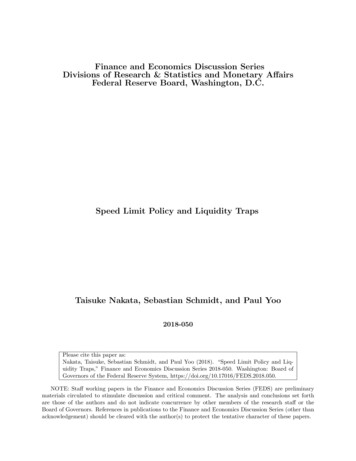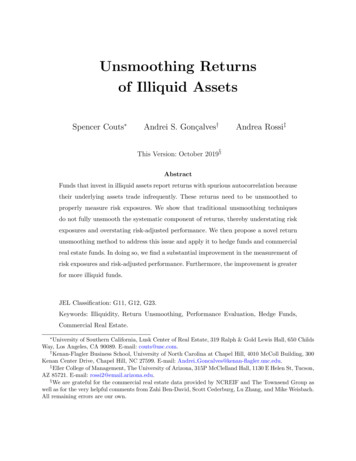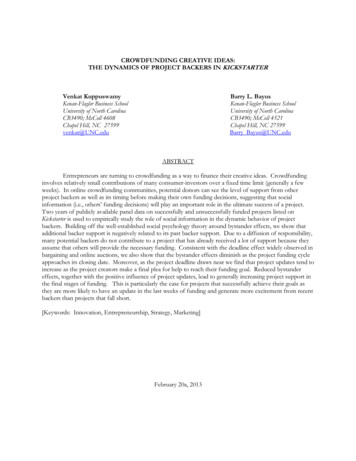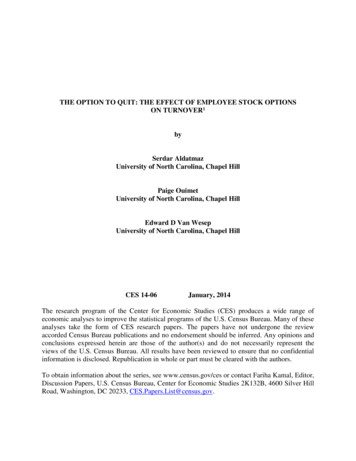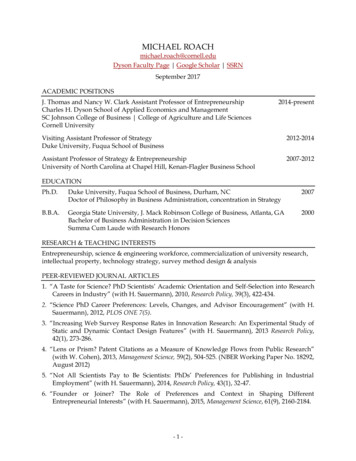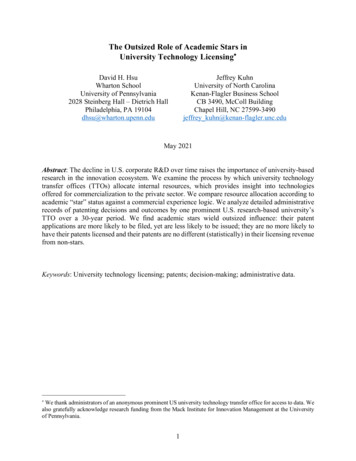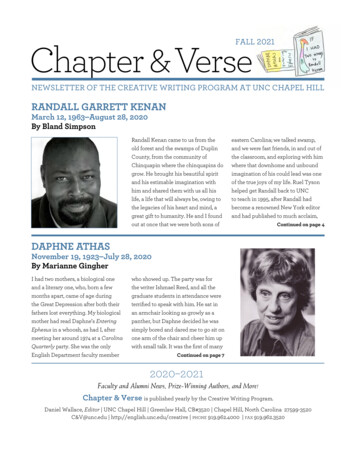
Transcription
FALL 2021Chapter & VerseNEWSLETTER OF THE CREATIVE WRITING PROGRAM AT UNC CHAPEL HILLRANDALL GARRETT KENANMarch 12, 1963–August 28, 2020By Bland SimpsonRandall Kenan came to us from theold forest and the swamps of DuplinCounty, from the community ofChinquapin where the chinquapins dogrow. He brought his beautiful spiritand his estimable imagination withhim and shared them with us all hislife, a life that will always be, owing tothe legacies of his heart and mind, agreat gift to humanity. He and I foundout at once that we were both sons ofeastern Carolina; we talked swamp,and we were fast friends, in and out ofthe classroom, and exploring with himwhere that downhome and unboundimagination of his could lead was oneof the true joys of my life. Ruel Tysonhelped get Randall back to UNCto teach in 1995, after Randall hadbecome a renowned New York editorand had published to much acclaim,Continued on page 4DAPHNE ATHASNovember 19, 1923–July 28, 2020By Marianne GingherI had two mothers, a biological oneand a literary one, who, born a fewmonths apart, came of age duringthe Great Depression after both theirfathers lost everything. My biologicalmother had read Daphne’s EnteringEphesus in a whoosh, as had I, aftermeeting her around 1974 at a CarolinaQuarterly party. She was the onlyEnglish Department faculty memberwho showed up. The party was forthe writer Ishmael Reed, and all thegraduate students in attendance wereterrified to speak with him. He sat inan armchair looking as growly as apanther, but Daphne decided he wassimply bored and dared me to go sit onone arm of the chair and cheer him upwith small talk. It was the first of manyContinued on page 72020–2021Faculty and Alumni News, Prize-Winning Authors, and More!Chapter & Verse is published yearly by the Creative Writing Program.Daniel Wallace, Editor UNC Chapel Hill Greenlaw Hall, CB#3520 Chapel Hill, North Carolina 27599-3520C&V@unc.edu http://english.unc.edu/creative PHONE 919.962.4000 FAX 919.962.3520
From the DirectorBack in March 2020, in ourlast class before springbreak, we talked aboutour plans for the briefvacation ahead. This wasin Senior Honors, the yearlong class inwhich a select group of writers spendsthe entire year together writing stories,and by the end of it collect them into ashort book—their thesis. One studentwas going to Copenhagen to see herboyfriend. Two were traveling toGreece to have the time of their lives.Another was lucky enough to be goingon . . . a cruise. But even then, early on,we knew that a cruise was not the bestidea; we laughed when she told us, andthen we gasped. Later she decided notto go on the cruise at all and spent herspring break in Charlotte instead.Everyone returned home from springbreak safely, but I never saw any ofthem again.Not true. I saw them all twice a weekfor the rest of the school year and foroffice hours and sometimes just tochat—on a screen. Zooming. It wasnot the same (what is?), but it wasn’tterrible, either. Ideas and creativityexist in a virtual environment almostas well as they do in a room withfluorescent lights and tiny windows.And there is something in the natureof writing itself that argues againstgroups: writers tend generally to be agroup of one.Still, each year in the Creative WritingProgram at UNC-Chapel Hill, ithappens that a greater life emergesfrom what amountsto a cocreation of ourvery selves through the honest andfriendly companionship of likeminded pilgrims. Had we not alreadybeen meeting for months, I reallydon’t know how it would have gone;a layered depth of shared experiencewould have been lost, for sure, andthere is something about simplytaking the time to get dressed andshow up somewhere that has an addedvalue attached to it.Other things: It’s crucial to see whatkind of shoes your students wear.See what falls out of their backpacks.Talking with a student before classbegins—about next to nothing—may be one of the most importantconversations you’ll have with her.It’s unnatural not to see someone, intheir entirety, just as it’s unnatural tocross the street when you see someonewalking toward you without a maskon. These are things we have learnedto do. Everything is in flux, but now atleast I can see my students’ shoes.There have been other, morepermanent changes, too. RandallKenan died. Daphne Athas died. LoydLittle, who taught here in the ’80s andwas one of my first writing professors,died as well. There were alsoretirements. Long-time cornerstonesof the Creative Writing ProgramMarianne Gingher and Alan Shapiroretired at the end of 2020–2021 schoolyear, and Pam Durban the yearbefore that. Anita Braxton, the trustedChapter & Verse 2020-2021 2program coordinator for many years,left the program in spring 2020.That is what this issue of Chapter &Verse is about: acknowledging thesedepartures. Our Program is goingto celebrate its seventy-fifth yearin 2022, and it’s difficult to imaginedoing that without these wonderful,brilliant writers and teachers aroundus. But we will. We have more studentsenrolled in our classes now than everbefore, and the Creative WritingProgram can claim more minorsand concentrations than any otherprogram in the English Department.We continue to be strong becauseof the contributions and dedicationof everyone we’ve lost, and it’s thatstrength that has allowed us to bringin new teachers, new writers: GabeBump, Karen Tucker, Tyree Daye,and our Kenan Writer, Julia RidleySmith, as well as Bonnie Williams, ournew program administrator. And this,this: the inimitable Ross White—poet,publisher, man of many hats—will bedirector of the Program beginning fall2022, and that alone is cause for greatcelebration.Thank you for your interest in andsupport of Creative Writing atCarolina. Our Program continues toflourish because of our students, ourformer students, and many otherswho see real value in committingourselves to teaching the art of writingto all comers.In fall 2020 Michael Parker received
the Thomas Wolfe Prize, and inspring The Rev. Dr. William J.Barber II and Jaki Shelton Green,North Carolina poet Laureate, wereour Frank B. Hanes Writers-inResidence, whose presence herewould not have been possible withoutthe support of Nancy White andRobin Hanes. Both events occurredremotely.read our books. But it’s a thank youespecially to our students. Thank youfor continuing to have faith in us. I’moften asked if current students are notas engaged or literate as students ofyore, before the digital world invadedthe prairie-quiet, contemplative lifeof teenagers. The answer to that isno. They are just as good as they everwere. And we’re glad they’re here.The Department of English, where wemake our home, is always the placeto be. I am certain there is no creativewriting program in the country witha relationship better than the onewe have with our department andits gracious leader, Mary FloydWilson. She supports and sustainsus; Jennifer Washington, businessofficer for the English Department,does the same. Linda Horne, RobinSamuels, Bonnie Williams, andCheryl Siler-Jones all do their partto keep our program robust.Of course, we owe a debt to our alliesand counselors in South Building,particularly Chancellor KevinGuskiewicz, College of Arts &Sciences Dean Terry Rhodes,Senior Associate Dean for FineArts and Humanities ElizabethEngelhardt, and Director ofCommunications Geneva Collins.This is a note of thanks to all of youwho attend our programs and shows,who support us financially, and whoI want to recognize specific privatefunds supporting Creative Writingactivities, including the RankinFaculty Support Fund, establishedby Alex Rankin (class of ’77); theBurrus Fund, established by AnnWilliams Burrus (class of ’52); andour Gift Fund, which is supportedChapter & Verse 2020-2021 3and supplemented by so many ofour friends and associates. TheWalker Percy (class of ’37) Fund,an endowment to help underwrite ourlecturers, was set in motion severalyears ago by Frank Borden Hanes,Sr. (class of ’42). And the RobertRuark Award, for student nonfictionwriting about North Carolina’s naturalworld, receives support from theRuark Society of Chapel Hill.Nancy White and Robin Haneshave been our staunch allies for manyyears, and for that we will be forevergrateful. Immense gratitude also goesto John Skipper for his avid andunwavering support of the ThomasWolfe Lecture.With good wishes to all,—Daniel Wallace, Director,Fall 2011–Spring 2022.
Elizabeth Moose,Randall and Daphne,Below, right: Randallwith Doris BettsRANDALL KENANContinued from page 1and Tom Rankin got him to Duke’sCenter for Documentary Studiesin 2002. And then our chair, JamesThompson, gained approval for anew position in Creative Writing atCarolina and gave me, as director ofthe Program, the honor of making thecall to invite Randall back home toUNC in 2003 as a colleague—as such,he was beloved by everyone, facultyand students alike. As he had whenhe was a student, Randall would oftenstop by my office, appear at the doorand say, “My Rabbi” (a nickname hegave me for reasons known but tohim), and pause before going on to thetopic of the day.One time when he stopped, spoke,and paused, I said, “Randall, I’vegot something special for you!” andhanded him a short tree branch.“What is this?” he asked.Chapter & Verse 2020-2021 4This, I said, is a piece of the old forest,a branch from an old persimmontree that stood on Polk Place frombefore it was Polk Place, original andwonderfully out of line with the straightcourses of planted oaks, till the oldtree died and was removed. You, I said,who have written most originally ofthe persimmon, and of so much else,deserve this memento. As I spoke,Randall’s smile grew and grew, and heclutched the persimmon branch to hisheart.
A new, young persimmon, replacingthe old, now grows in that same spot onour campus, and that is where I will goto stop and speak with Randall as timegoes on. For, like everyone who knewand loved him, I cannot bear to saygoodbye. So, till we meet again, Randall,I will borrow from the Bard and only say,“Good night, sweet prince; and flights ofangels sing thee to thy rest.” Amen.10/21/2020 In the months since he died, I’ve beenhaving dreams with Randall in them.They aren’t dreams about him, really;he is just there. In one he’s sitting ina chair, occasionally laughing withsomeone. We make eye contact oncein another, in passing, and smile. I hadone dream where I see him on campus,and he waves at me and then turnshis attention to a student. Then I hada dream I thought he was going to bein, but he never arrived. He may havebeen late, and by the time he got there,the dream was over, and I was awake.He probably sent a text to me in mydream-world telling me how he’d losttrack of time and was sorry—he’d reallymeant to be in the dream. Next time.So much of Randall’s life was lived likethis, the way he appears in my dreamsto me now. He was on the inside andthe outside at the same time. He washere, but then he wasn’t. He coulddisappear for long periods of time andhe was, more often than not, the last toarrive, the first to leave.“If you’re consistently late,” he told meonce, “it becomes an expectation. Noone gets mad at you because it’s whatthey thought was going to happenanyway. Being late becomes justanother way of being on time.”Randall lived alone his entire adult life.Family and friends were vital to him;he loved them ferociously and activelyand he never let them out of his sightfor too long. He had a genuine lovefor his people, and he was genuinelyloved. But he was also singularly alone.That front door he walked through atnight separated his two worlds. Hedidn’t share his home with anybody.Chapter & Verse 2020-2021 5There was a lot of who he was he didn’tshare. Abandoned by his biologicalparents, growing up gay, growing up agenius, and then coming into a culturewhere he was, by his own admission,“the only negro in the room,”contributed to this character trait.Being an artist whose magnificentimagination was central to his processneeded room as well.I’ve never had a good friend who wasmore present and more absent thanRandall was. But, like being late, it wasjust a part of who he was. I missed himat parties because he rarely came toparties. I missed him at dinners. It was
much easier to get him to come outone-on-one. He had a lot of friends Inever met, and he meant to keep itthat way.Looking back at what I’ve written itdoes feel like I’m complaining, that I’masking for a different Randall than theone we got. But I’m not. I loved him. Hewouldn’t have been Randall without theseparateness he was born into and thencultivated, and without that, who knows,we might not even have his books.People talk about suffering and its rolein the creation of art, and I supposeit has its place. But how many booksis loneliness worth? One? Two? Howmany stories? And had he been ableto trade one of his books for love, fora man to come home to, which bookwould it have been? Without all thebooks we may not be rememberinghim now, of course, in our littleessays, but then we wouldn’t have tobe remembering him at all: he wouldprobably be here. He would be distant,quiet at times, late, sometimes lonely,and texting me long after I’ve gone tobed about Bruno Mars or Moby Dick orwith the obituary of someone he loved,in his life or in their art.I did have one dream Randall was in,one he seemed to be in just for me.The dream was in November 2020,three months after he died, and in thedream he’s been dead for that samelength of time. Three months. It’s acold winter’s day. I knock on the doorof his family’s house in Chinquapin,North Carolina. I’m there to see hiscousin Nikki but Randall answers thedoor, not expecting me as much as I’mnot expecting him because, of course,he’s supposed to be dead. He looks likehe may have just woken up. But thenhe laughs, shrugs his shoulders, andlooks at me with an expression I haveseen before, the one with the eyebrowsraised, the bashful smile hoping forforgiveness, like I guess I’m busted,but please don’t tell anybody! AndI don’t say anything to him but I’mshaking my head, thinking that afterpretending to be dead all this time,you’re actually alive? Jesus, Randall.I’m a little pissed, but I’m not surprisedat all.—Daniel WallaceIn honor of Randall Kenan’sextraordinary legacy as an authorand his passion for bringingfellow writers to Carolina, we havecreated the Randall KenanMemorial Fund to carry hisname forward as it enhances themission of the Writer-in-Residenceprogram by continuing visitsof distinguished writers to ourcampus for years to come. Tocontribute to this fund, please clickthis link. Thank you.Chapter & Verse 2020-2021 6
DAPHNE ATHASContinued from page 1dares she dispensed over our longfriendship, and because I never saidno to a one of them, I am no longera mouse.For twenty years, until she stoppeddriving on interstates, Daphnedrove from Carrboro to my house inGreensboro for Thanksgiving, totinghomemade cranberry sauce in her littlegreen bowl. Mother was there, too, andshe and Daphne enjoyed animatedconversations about their similarhistories. My mother wasn’t booksmart in the way Daphne was, but shehad humor and intuition and brighteyed curiosity that Daphne doted on.Mother instructed my heart; Daphne,less guardian than goader, waved herbedazzling wand over my mind.Ask any of us who loved her andwere mesmerized by the nearlyextraterrestrial pleasures of her cosmiccompany—ask former students AlaneMason, Lydia Millet, Michael Parker,Mark Meares, Randall Kenan (if onlywe could ask him)—how she did it:her spell-binding trick of ravenouslistening combined with marathondisquisitions that darted from thesublime to the ridiculous. She wasa scholar of the world, dislikedignoramuses, delighted in enthusiasts,and had a soft spot for goofballs.She left us July 28, 2020, exactly onemonth to the day before Randall. Askanyone who knew and loved them both:Chapel Hill will never feel the same.We go on, of course, create new, lessglamorous idols and myths, butsomething like the last leaf of innocencehas left the tree of knowledge that thetwo of them planted and grew for us(and one another) to dance around,celebrating its everlasting radiance.She called Randall “the Princeof Hillsborough.” She called me“Magnetessa” and sometime “Magnet”for short. She cared more aboutstriving than triumph. She thoughtself-doubt, like shyness, was silly andself-indulgent in adults. There werefar more inventive ways to be silly,Chapter & Verse 2020-2021 7like writing nonsense poems, likepontificating on everything from volesto politicians (similar animals in herview), or bouncing on grammar rulesto see how much like a trampolinethe English language could be. Howabout bursting into song, anywhere,any time, and harmonizing? She lovedcollaborative glee. Often, in the middleof the crosswalk in front of the JadePalace restaurant in Carrboro, she’dhoist her cane, do a little soft-shoenumber, and belt forth a song. Ofcourse I joined in, and we’d carry onas if we were in a musical—until somecar came along. We crashed a bigparty once because I wanted to meetEudora Welty and we hadn’t beeninvited but Daphne knew the hostess.We traveled to Greece together andsat on the beach in Kamares on theisland of Sifnos eating lunch in theraggedy shade of cypress trees, ourfeet in the sand, drinking Mythosbeer and philosophizing all afternoonbefore our evening swim. In Athens,she led me up what seemed to beSisyphus’s hill to the funicular atMount Lycabettus from which you can
see all of Athens. Then, because therewere no more taxis, back down the hillin the dark we trudged to our hotel—she was an inexhaustible eighty-threeyears old.She hitchhiked across Egypt, spentsummers in Greece (her father wasan immigrant from Pylos), taught asa Fulbright in Tehran, was thrilled,after she smashed her bike in a trafficaccident, that the EMT who scrapedher off the sidewalk had read Tolstoy.They talked literature all the way tothe hospital. There will only ever bethe singular and distinctive her thatmakes one feel all the more lucky tohave known her both as an elder oracle(she hated being called an oracle) andin her heyday, the 1970s and ’80s, whenshe and Doris Betts rocked Greenlawwith their conspiratorial cackling.They gave readings together, Doriswearing dramatic scarlet and Daphnein her regal purple tunic. Iconiclooking as they strode to the podium,it seemed as if statues of Liberty andAthena had come to life. With pluck,brains, ferocious confidence, andcharm, they were in the vanguard offeminist awakenings at this university.Daphne, who was ninety-six whenshe died, taught at UNC from the late1960s until 2009.We who loved her have stashes ofphotos, piles of her loquacious letters,and the elegant, funny, playfullysubversive books she wrote. Futurestudents will meet her through theLOYD LITTLEcourse she invented as Glossolalia thatwe now call Gram-o-Rama, a legacycourse that turns the grammar lessoninto performance art and celebratesthe goofball in us all. She lives on,the way Edward Lear, Lewis Carroll,Dickens, Aesop, Socrates, Aristotle,and Tolstoy live on. The way the oceanlives on, the moon and stars, riddles,music, hope, absurdity, sorrow, joy, andMother Goose.The Daphne Athas Fundsupports the teaching of Gramo-Rama by hiring visiting dramacoaches and a videographer torecord performances. To contributeto this fund, please click this link.professor before or since has read astory of mine more attentively or withmore care. My first published story(for our own Cellar Door) was writtenin his class. I still have his notes onit, somewhere. His focused attentionmay have been a consequence of hisname. The army, upon his enlistment,discovered that his birth records haddropped an L from his name, andcame to understand that he was legally“Loyd” and not the “Lloyd” he’d alwaysgone by. He realized that he’d have togo through a legal name change to setit all to right and simply decided not togo through the hassle, and lived a long,happy life without the other L.September 12, 1949 –October 16, 2020Loyd Little died on October 16, 2020.Loyd was the very first winner of thePEN/Hemingway Award for his novelParthian Shot in 1976. Four years later,as a transfer to UNC, I took his Introto Fiction class. I didn’t know aboutthe PEN Award, of course; he wasnot the kind of man to advertise forhimself. He was a kind, generous, andmeticulous reader of his students’ work.He footnoted his own comments andadded pages of supporting argumentstyped out on unlined, yellow paper. NoChapter & Verse 2020-2021 8
RetiringANITA BRAXTONFrom my first day as director of theCreative Writing Program in 2011,Anita Braxton was there to educate,guide, and encourage me. I neededall of that since I had no real idea howto do this job. She herself learnedhow to become a top-drawer programassistant from Michael McFee, whopreceded me as director, and so I waslucky enough to inherit a program thatwas already running smoothly; myreal job was just to not mess it up. Andthough I had many opportunities to doprecisely that, Anita was there to saveme from my ignorance.Anita had been planning to retire atthe end of the 2020 school year, anddid. Coincidentally, that’s when Covidhit; there was a hiring freeze, and soher desk and job remained empty. Notthat we needed any more proof of howessential she was to the running of thisprogram, but we certainly had it then.We miss her. Anita and I, along withBeverly Taylor and Linda Horne, sharedin the same family of rat terrier pups,some of whom have left us as well.Friends and dogs—two of the best thingsthere are in life, and here we found both,in Greenlaw. Thank you, Anita.PAM DURBANWhen Pam came to campus duringthe Betts Chair job search, she pulledme aside after a few days and said,“What are you guys hiding? Whereare the skeletons in your closet?” As aveteran of creative writing programswhere the faculty did not get alongparticularly well, she was suspicious ofthe friendly climate at Carolina. “We’renot hiding anything,” I said. “There areno skeletons. I’m afraid you’ve falleninto the happy valley.”What a joy to have Pam Durban joinus in our sunny valley for severaldecades. She was the perfect heir toDoris Betts’s legacy and her secondfloor office: a superb teacher, preciseand tenacious and inspiring; a writer ofthe first order, so artful and thoughtfuland inventive; and a colleague tobe relied on, at any time, withoutquestion. How I loved stopping by tovisit between classes, to talk seriouslyif needed but mostly to gossip aboutstudents, and chat about what we werereading or watching, and laugh for afew minutes before getting back towork. All of us—especially her luckystudents—are deeply grateful that shecame here, and served the literarycommunity so well, and became partof our happy family.—Michael McFeeChapter & Verse 2020-2021 9MARIANNEGINGHERMarianne Gingher has been my friend,teacher, colleague, drawing buddy,inspiration, and guiding light fordecades. She retired in spring 2021 withnone of the fanfare and recognition thatretirement deserves. How manyhundreds of students has Mariannetaught? How many lives has shechanged? How much of her heart hasshe shared with us? How much couldshe possibly have left? She has alwaysreminded me of the woman beingdescribed in a poem by TheodoreRoethke, “When small birds sighed, shewould sigh back at them.” I turned toher for advice and direction andfriendship and will continue to do thatfor as long as she will let me. See youdown the road, Marianne. When I was in Marianne’s Intro toFiction class in fall 2010, she had tocancel class one day for a very unusualreason: the previous night, she said,she’d woken to what sounded like aBoeing 747 taking off inside her skull.As it turned out, a moth . . . had flown . . .into her ear . . . and gotten stuck there!With medical assistance it was safelyextracted, and she arrived in class thenext day with a tale as well honed asyou’d expect from a storyteller of hercaliber. I assume this ambitious insecthad designs on taking up covetedresidence in Marianne’s capacious,well-appointed brain, absent a direct
anatomical pathway into her equallycapacious and generous heart.Fortunately for me, I haven’t hadto resort to such extreme means tobenefit from these gifts of Marianne’s.That fall 2010 workshop is where sheconvinced me that writing fictionwasn’t just a hobby but a legitimate lifepursuit. Since then, she’s been guidingme and so many lucky others in thatpursuit with her patient instructionand vivacious friendship. I’m sad forthe students who won’t get to receivethese gifts of hers after her retirement.Those of us who have will keepflocking to her like moths to the light.—Katherine Proctor,Honors Student in Creative Writing,2010–2014Pam Durban, Marianne Gingher, and Alan ShapiroCall her the human superlative. Thetallest and blondest, for starters. Thebubbliest, the friendliest, the mosteffervescent and imaginative andgenerous. The laugh-till-you-burstfunniest. The wisest and kindest. Themost gracious. Without question, thespunkiest. She was the professor withthe long line of students spilling outthe door, vying to bask in her office’spink glow. The colleague who slidhomemade valentines under yourdoor. For more than forty years,Marianne Gingher ruled GreenlawHall as the mischievous queen of oursignature classes. Gram-o-Rama. FlashFiction. Writing for the Puppet Stage.Memoir. Every writer from NYTbestseller Sarah Dessen to PEN/Hemingway winner Ben Fountain tothree-time O. Henry Awardee MichaelParker flourished under her reign.Marianne also codirected the ThomasWolfe Scholars Program, which senther searching for “the best damnwriter” in high schools across Americaand bringing them to Carolina, whereshe treated them to Sandwich Night inher treehouse on Rosemary Street. Allof this, and she continuouslypublished her own lauded work: twomemoirs, two anthologies, a novel, ashort story collection, and scores ofessays. She even cofounded a puppettheater called Jabberbox, which pliedits audiences with tomatoes sewn fortossing. Everywhere Marianne went,she left a trail of glitter. Today, itChapter & Verse 2020-2021 10stretches clear to Greensboro, whereshe has retired. All we can do inGreenlaw is keep marveling (andshimmering) at her legacy.—Stephanie Elizondo GriestALAN SHAPIROAlan Shapiro retired from teaching atthe end of the 2020–2021 school year.A lynchpin of the program for decades,and my good friend, he will be sorelymissed. On learning of his retirement,this is what Jonathan Farmer, the poetand former student of Alan’s, wroteabout him:“Alan would tell us that art waswakefulness. It was, he insisted, theopposite of sleep. And he said it with
conviction—present and alert in thesentences he repeated over and over,the same way he is, for example, intelling a joke, or reciting a poem frommemory, that way in which repetitionand discovery live together in theagility of Alan’s mind.“Alan’s poems are—like his teaching,his essays, his translation, his fiction,himself—awake. Relentlessly awake, Imight say, except that sounds grim—and they are (and he is) rarely that, nomatter the sorrows and suffering theycontend with, dramatize, and even insiston. The lesson of those disastrous yearswas both that disaster cannot be wardedoff, no matter how careful we are, andthat consciousness—in part because itis so precarious; because it can be,will be, annihilated; because it can beturned into a source of suffering—is, or,at least, it can be, a gift.”And I will quote from something hisfriend, the poet Tom Sleigh, said ofhim: “Alan has an intelligence thatknows Henny Youngman and RodneyDangerfield jokes as well as linguistics,neuroscience, astrophysics, and ofcourse an encyclopedic knowledgeof poetry and literature. He also lovesdogs because they aren’t busy tryingto tell us what we ought to think andfeel, but instead, seem to take it forgranted that our job is to be out andabout, sniffing at the world, as opposedto sternly judging it.” Here is to abright future of sniffing at the world.SUSAN IRONSSusan Irons never taught in the Creative Writing Program,but without her we would not have become the programwe have. Susan has been the guiding light and directorbehind our two major yearly events, the Wolfe Prize andthe Distinguished Visiting Writer program. She hasbeen doing this for twenty years. Choreographing thesevisits, some of them for as long as a week, is, like jugglingchainsaws, even more complicated than it looks. It takesa person who can see the forest and the trees, and Susanis one of those rare people. A few of the writers whohave come here under her watchful eye: Terry TempestWilliams, Joan Didion, Tobias Wolff, Natasha Tretheway,Sandra Cisneros, Elizabeth Spencer. The list goes on, aprocession of greatness her greatness made possible.Thank you, Susan, for making magic happen.Chapter & Verse 2020-2021 11
FacultyNewsGABRIEL BUMP grew up in SouthShore, Chicago. His debut novel,Everywhere You Don’t Belong, wasa New York Times Notable Book of2020 and won the Ernest J. GainesAward for Literary Excellence, theGreat Lakes Colleges AssociationNew Writers Award for Fiction, theHeartland Booksellers Award forFiction, and the Black Caucus of theAmerican Library Association’s FirstNovelist Award.GABRIELLE CALVOCORESSI’spoems have been published or areforthcoming in numerous magazinesand journals including Baffler, NewYork Times, POETRY, Boston Review,Kenyon Review, Tin House, and NewYorker. Calvocoressi is an editor atlarge at Los Angeles Review of Booksand poetry editor at Southern Cultures.MICHAEL CHITWOOD’s mostrecent book, Search & Rescue(LSU Press, 2018), was named theL. E. Phillabaum Poetry Award winnerand the winner of the 2019 Library ofVirginia Literary Award in Poetry.MARIANNE GINGHER, professoremerita, spent her last year of fulltime teaching at UNC as the DorisBetts Term Professor and retired inJuly 2021 after more than forty yearsof teaching in the C
the classroom, and exploring with him where that downhome and unbound imagination of his could lead was one of the true joys of my life. Ruel Tyson helped get Randall back to UNC to teach in 1995, after Randall had become a renowned New York editor and had published to much acclaim, Continued on page 4 RANDALL GARRETT KENAN


